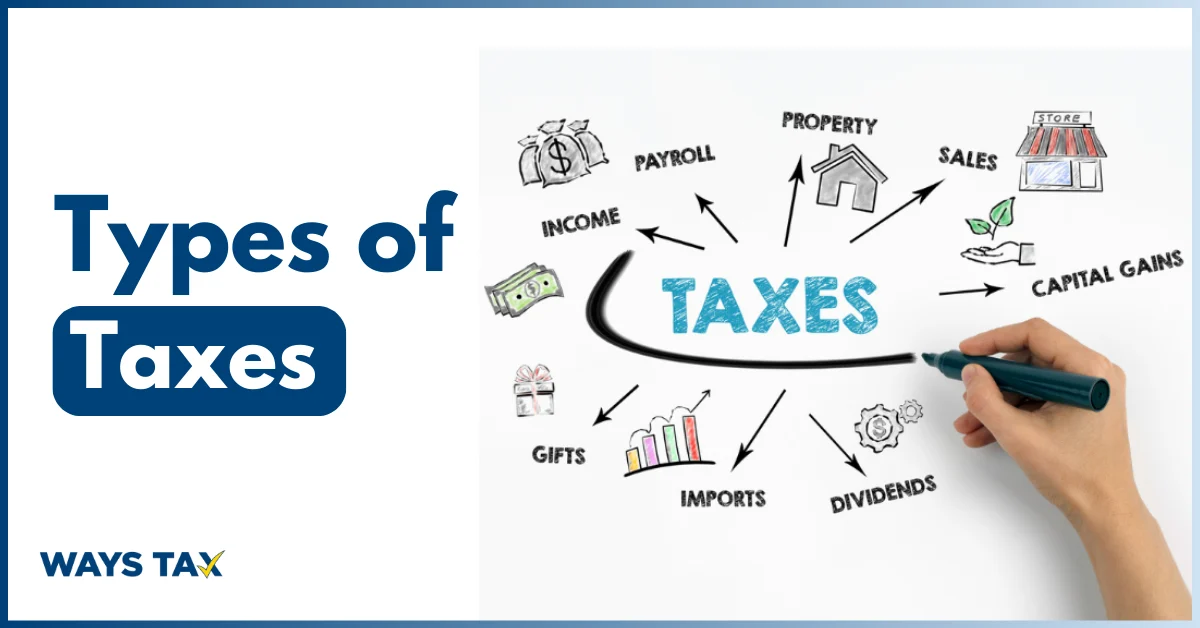Types of Taxes in Pakistan: Everything You Need to Know
Every nation’s economic structure depends heavily on taxes, and Pakistan is no different. Whether you’re a salaried individual, business owner, freelancer, or investor, understanding how taxes work in Pakistan can help you stay compliant and avoid penalties while also optimizing your returns.
In this comprehensive 2026 guide, we break down the types of taxes in Pakistan, how to file them, and key insights that every taxpayer should know.
What Are Taxes?
The government imposes taxes, which are mandatory financial levies, on both persons and corporations. The government uses these monies to run public services, including defense, healthcare, education, and infrastructure.
Why Citizens Pay Taxes
Citizens guarantee their access to public services and support national growth by paying taxes. They receive business opportunities, legal protections, and access to social programs in exchange.
Role of FBR in Pakistan’s Tax Collection
In Pakistan, the Federal Board of Revenue (FBR) is responsible for collecting federal taxes and implementing tax laws. It oversees income tax, sales tax, federal excise duty, and customs duty.
Basic Types of Taxes in Pakistan
Taxes in Pakistan are mainly divided into two broad categories. These Types of Taxes are:
1. Direct Taxes
These are levied directly on a person’s or entity’s income and wealth. The burden of the tax cannot be shifted.
Types of Direct Taxes
1. Income Tax
Applied on salaries, business profits, and other personal income.
2. Property Tax
Levied by provincial governments on property ownership or rental income.
3. Capital Gains Tax (CGT)
Tax on profits from selling capital assets like real estate and shares.
2. Indirect Taxes
These are applied on goods and services and are collected by intermediaries (like retailers), who pass the burden to the end consumers.
Types of Indirect Taxes
1. Sales Tax
Sales tax, often levied at a uniform rate of 18%, is assessed on the sale of goods and services.
2. Value-Added Tax (VAT)
Value-Added Tax (VAT) is a kind of sales tax that is gathered at every production or distribution stage.
3. Excise Duty
Excise taxes levied on the manufacture of particular products, such as fuel, sugar, and tobacco
4. Customs Duty
Charged on imported goods at the point of entry.
Direct Taxes vs Indirect Taxes
Here’s a quick comparison of the two types:
| Aspect | Direct Taxes | Indirect Taxes |
| Definition | Levied directly on income or wealth | Levied on goods and services |
| Examples | Income Tax, CGT, Property Tax | Sales Tax, Customs Duty, Excise Duty |
| Payer | Individual or organization | Consumer (via intermediary) |
| Transferable? | No | Yes |
| Progressive/Regressive | Progressive | Often regressive |
How to File Taxes in Pakistan

Documents You Need
- CNIC
- Salary certificate/business financials
- Bank statements
- Tax deduction certificates (e.g., from SadaPay, PTCL)
- Asset details (for wealth statement)
Registration with FBR
You must register on FBR’s IRIS portal to file your tax return. This process requires an NTN (National Tax Number), which you can get using your CNIC.
Need help? Use our Pakistan Tax Preparation Service here.
Pay Tax in Pakistan in 4 Steps
1. Get Your NTN (National Tax Number)
You can get your NTN automatically using your CNIC or apply online via the FBR portal.
2. Register on the IRIS Portal
Create an account on IRIS and log in.
3. File Your Income Tax Return
Input your income, deductions, and assets. Submit both the Income Tax Return and the Wealth Statement. Check out our detailed guide on how to file your income tax return in Pakistan.
4. Verify Submission and Payment
Download the CPR (Computerized Payment Receipt) if any tax is payable. Try our Tax Calculator for 2025-26 to estimate your income tax.
Tax Incentives for Foreign Investors
Pakistan provides a number of tax breaks to entice international investment, including:
Zones of Special Economic Interest (SEZs)
Businesses that operate in SEZs benefit from lower tax rates and exemptions.
Profit Repatriation
Under some circumstances, foreign investors may repatriate profits and dividends without incurring significant taxes.
Holidays & Exemptions from Taxes
Reduced rates or multi-year tax vacations may be available to new industries.
Laws of Pakistani Taxes
| Law | Year | Purpose |
| Income Tax Ordinance | 2001 | Covers all income-related taxes, returns, and filing procedures. |
| Sales Tax Act | 1990 | Governs how sales tax is applied, collected, and refunded. |
| Federal Excise Act | 2005 | Imposes excise duties on specific goods and services. |
| Customs Act | 1969 | Regulates import/export procedures and collection of customs duties. |
Challenges in Pakistan’s Tax System
- Tax Evasion
Many individuals and businesses avoid taxes through undocumented transactions.
- Low Tax-to-GDP Ratio
Pakistan has one of the lowest tax-to-GDP ratios in the region, affecting development.
- Compliance Issues
The complexity of filing processes deters many from registering or staying compliant.
Tips to Stay Compliant and Reduce Your Tax Legally
- Claim Allowable Deductions
Deductions on education, health, donations, and investments can reduce your taxable income.
- Keep Proper Records
Maintain digital and paper records of all income, receipts, and deductions.
- Stay Updated with FBR Regulations
Tax laws change yearly. Stay informed by following updates from FBR or through a Waystax tax advisor.
Types of Taxes: FAQs
Conclusion
There are many types of taxes in Pakistan but it is doable and advantageous with the correct information and resources. Whether you’re filing for the first time or optimizing your returns, staying compliant with tax laws can save you money and legal trouble.
Need professional help? Book a tax consultation with Waystax now.

